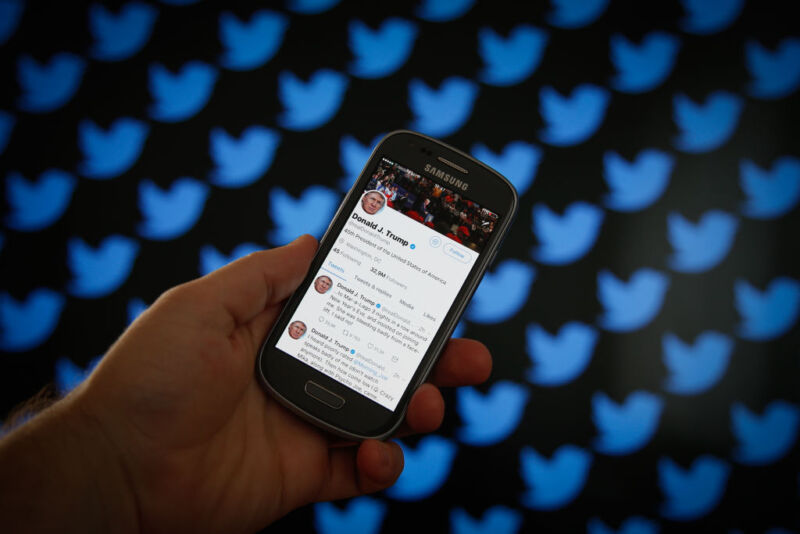
Today, an unsealed court document revealed that, earlier this year, a federal judge held Twitter (now called X) in contempt of court. The judge imposed $350,000 in sanctions.
Sanctions were applied after the social media platform delayed compliance with a federal search warrant that required Twitter to hand over Donald Trump’s Twitter data without telling the former president about the warrant for 180 days.
At first, Twitter resisted producing Trump’s data and argued that the government’s nondisclosure order violated the First Amendment and the Stored Communications Act. However, US circuit judge Florence Pan wrote that the court was largely unpersuaded by Twitter’s arguments, mostly because the government’s interest in Trump’s data as part of its ongoing January 6 investigation was “unquestionably compelling.”
Last week, Trump was indicted on felony charges for working to overturn the results of the 2020 election, AP reported. Trump has since pled not guilty and continues to post on Truth Social, where he commented on today’s Twitter revelations. The former president said that he “just found out” that “crooked” Joe Biden’s Justice Department “secretly attacked” his Twitter account. He called the search warrant a “major ‘hit'” to his civil rights.
“Does the First Amendment still exist?” Trump wrote.
Twitter did not respond to Ars’ request to comment.
Why was Twitter held in contempt?
The unsealed court document provides a timeline of events leading the court to hold Twitter in contempt.
Twitter’s troubles started on January 17, 2023, when the government secured a search warrant that “directed Twitter to produce data and records related to the ‘@realDonaldTrump’ Twitter account.” The government then took the extra step to apply for a nondisclosure order, which was granted because “the district court found that there were ‘reasonable grounds to believe’ that disclosing the warrant to former President Trump ‘would seriously jeopardize the ongoing investigation’ by giving him ‘an opportunity to destroy evidence, change patterns of behavior, [or] notify confederates.'”
The government immediately tried to serve Twitter with the search warrant—which required Trump’s data to be shared within 10 days—but the website where Twitter gathers legal requests was “inoperative.” It took two days before Twitter’s website was fixed and the government was able to submit the warrant, and even then, Twitter did not immediately respond. Finally, on January 25, the government reached Twitter’s counsel, who said “that she ‘had not heard anything about [the] [w]arrant.'”
Then, on February 1, four days after failing to meet the deadline, Twitter “objected to producing any of the account information.” The government immediately requested a hearing where Twitter had to show cause why it should not be held in contempt for missing the deadline.
That hearing was scheduled for February 7. During the hearing, Twitter “requested that the court stay its enforcement of the warrant until after it adjudicated Twitter’s motion to vacate or modify the nondisclosure order.” Essentially, Twitter didn’t want to hand over data without Trump’s knowledge, but the court denied Twitter’s request and “found Twitter in contempt of court.”
At that point, Twitter was given an “opportunity to purge its contempt by producing” Trump’s account information. The court checked with Twitter and confirmed that it was capable of meeting a rapid deadline and turning over the data by 5:00 pm that evening.
“I believe we are prepared to do that,” Twitter’s counsel said. “Yes, Your Honor.”
Twitter missed the deadline, again
To encourage Twitter to meet this new deadline, the court threatened hefty fines for non-compliance. The judge laid out a formula for “sanctions that would accrue at a geometric rate: $50,000 per day, to double every day that Twitter did not comply.” At that time, Twitter did not object to the sanctions formula, Pan noted in the newly unsealed opinion.
“Twitter missed the 5pm deadline,” the document said. “Although Twitter timely produced some records, its production was incomplete.”
Ultimately, it took Twitter until 8:06 pm on February 9 to produce all the data that the government sought. According to the court, that was three days late. Twitter tried and failed to argue its way out of sanctions by saying that it acted in good faith to supply information as quickly as possible.
“Twitter contends that it ‘substantially complied with the [w]arrant’ because ‘there was nothing [it] could have done to comply faster’ after the court issued the February 7 order,” the court document said.
The court rejected Twitter’s “good faith” arguments, mainly because the company blew past the original deadline and repeatedly failed to raise concerns at earlier opportunities.
On March 3, the court denied Twitter’s attempt to modify or vacate the nondisclosure order, found Twitter in civil contempt, and imposed the $350,000 contempt sanction.
While Twitter appealed the decision, the company “paid the $350,000 sanction into an escrow account maintained by the district court clerk’s office.”
The appeal process stretched on for months. On June 20, the government modified its nondisclosure order to “permit Twitter to notify the former President of the existence and contents of the warrant.” That meant that “the only limitation on the disclosure would be” for Twitter “to withhold the identity of the case agent assigned to the investigation.”
Meanwhile, Twitter was late in its attempts to oppose the sanctions formula. The court opinion said that Twitter’s counsel “belatedly” pointed out that “roughly one month of noncompliance” would have “required Twitter to pay a sanction greater than ‘the entire world’s gross domestic product.'”
Twitter continued challenging the nondisclosure order and the sanctions, but the court rejected most of its arguments and ultimately affirmed the contempt sanctions, issuing its opinion on July 18.
“Twitter never raised any objection to the sanctions formula, despite having several opportunities to do so,” Pan wrote in the opinion. “The company thus appeared to acquiesce to the formula. Moreover, the $350,000 sanction ultimately imposed was not unreasonable, given Twitter’s $40 billion valuation and the court’s goal of coercing Twitter’s compliance.”
https://arstechnica.com/?p=1959973

